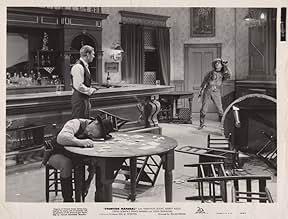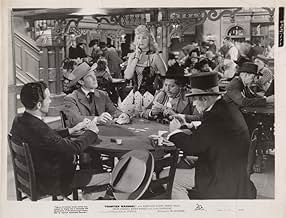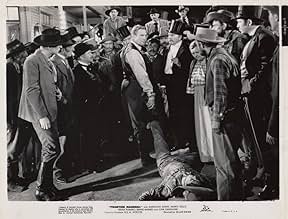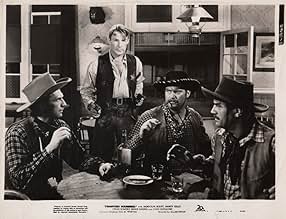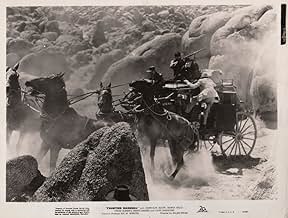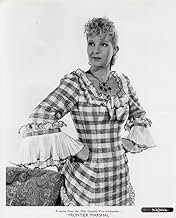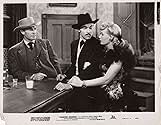AVALIAÇÃO DA IMDb
6,6/10
1,1 mil
SUA AVALIAÇÃO
Adicionar um enredo no seu idiomaWyatt Earp agrees to become marshal and establish order in Tombstone in this very romanticized version of the gunfight at the O.K. Corral.Wyatt Earp agrees to become marshal and establish order in Tombstone in this very romanticized version of the gunfight at the O.K. Corral.Wyatt Earp agrees to become marshal and establish order in Tombstone in this very romanticized version of the gunfight at the O.K. Corral.
- Prêmios
- 1 vitória no total
Dell Henderson
- Dave Hall
- (as Del Henderson)
Eddie Dunn
- Card Player
- (cenas deletadas)
- Direção
- Roteiristas
- Elenco e equipe completos
- Produção, bilheteria e muito mais no IMDbPro
Avaliações em destaque
Yes, yes, I know. My Darling Clementine(MDC) is a famous remake of this picture. That one got the John Ford treatment and went into greater depth as far as character development goes. But there's nothing wrong with "Frontier Marshal" and it can stand on its own. First off, since it is an action western it had a better lead actor in stalwart Randolph Scott - Henry Fonda was a more cerebral actor and not really a two-fisted type. Second, I think Caesar Romero played Doc Holliday with more heart than Victor Mature, who was a limited actor.
In MDC, the OK Corral confrontation was better and had more tension but the barroom bimbo was Binnie Barnes, who did a better job than Linda Darnell. Ward Bond was in both pictures and got a promotion in MDC to Earp's brother. And you get a chance to see Eddie Foy Jr. in the earlier movie.
"Frontier Marshal" is only 71" long and therefore not as comprehensive as MDC. In sum, I guess the worst thing that could be said about "Frontier Marshal" is that MDC was made, which in sheer production value diminishes the whole enterprise. If you like westerns, see this one. You will appreciate it better if you haven't seen MDC - which I also feel suffers from one of the lamest titles in Hollywood annals and detracts from the final product. "Frontier Marshal" was on FMC the other morning and I rated it a seven.
In MDC, the OK Corral confrontation was better and had more tension but the barroom bimbo was Binnie Barnes, who did a better job than Linda Darnell. Ward Bond was in both pictures and got a promotion in MDC to Earp's brother. And you get a chance to see Eddie Foy Jr. in the earlier movie.
"Frontier Marshal" is only 71" long and therefore not as comprehensive as MDC. In sum, I guess the worst thing that could be said about "Frontier Marshal" is that MDC was made, which in sheer production value diminishes the whole enterprise. If you like westerns, see this one. You will appreciate it better if you haven't seen MDC - which I also feel suffers from one of the lamest titles in Hollywood annals and detracts from the final product. "Frontier Marshal" was on FMC the other morning and I rated it a seven.
What's most interesting about Frontier Marshal is the fact that it is clearly the genesis of My Darling Clementine, directed by John Ford seven years later. It is hard to view this movie without automatically thinking of the parallel scenes in MDC, and Ford's film draws heavily on the inter-relationships of Doc Holliday, Wyatt Earp, Sarah(Clementine in Ford's film) and the saloon girl, Jerry(Chihuahua). Other scenes are reworked into Ford's film as well
the disarming of the drunken Indian, dunking of the saloon girl into the trough, Doc Holliday attempting to redeem himself by performing surgery on a gunshot victim(in this case, the son of the Mexican bartender(in Ford's film, it was Chihuahua, Doc's `girl'), and a wandering theatric (a comic here, a Shakespearian thespian in MDC). This film is much slighter, with fewer themes and subtexts than Ford's and concentrates mostly on the relationship between Earp and Holliday and Holliday's redemption at the end. It plays out like a programmer, running a mere 71 minutes, so granted there isn't much time to devote to anything else. The themes of chaos versus order, civilization versus wilderness are only hinted at, and Randolph Scott is adequate as Wyatt Earp but without the underlying vulnerability(and humor) of Fonda's performance. The same might be said of Cesar Romero as Doc Holliday (for some reason changed to Halliday). He doesn't have the depth of Victor Mature's tortured Doc, in what was perhaps his best performance in any film, but the same self-destructive streak is evident as he attempts to drink himself to death, only to be stopped by Earp. Clearly, MDC was the more thought provoking of the two, but it cannot be denied that without Frontier Marshal, there would have been no MDC, or at least the one I consider a true western classic. What a quirk of fate that Ward Bond is in both films--the ineffective town marshal here, and later promoted to the role of Morgan Earp in Ford's version.
I'm not a huge fan of the Western genre but there are a few Westerns that really enjoy - this film goes into the my liked Western films. It is highly fictionalized version of the events that lead up to the famous gun fight but really fun to watch.
I have to say I enjoyed the entire cast which is one of the reasons why I like this film - it's not just the story and action on screen but the actors themselves that makes this particular film worth watching to me.
Binnie Barnes as Jerry - she really tickled me, constantly trying to keep up her tough exterior but in the end we saw the softer side of Jerry. A character I really liked watching.
Scott and Romero were good together. While Carradine, Chaney and Sawyer was made a great trio of "villains". You can't but to laugh as some of the things that happens - in particular when Doc Halliday (Romeo) gets Pringle (Chaney) to dance... lol.
Anyway, this one worth checking out if you haven't seen it already. Fictionalized Fun.
8.5/10
I have to say I enjoyed the entire cast which is one of the reasons why I like this film - it's not just the story and action on screen but the actors themselves that makes this particular film worth watching to me.
Binnie Barnes as Jerry - she really tickled me, constantly trying to keep up her tough exterior but in the end we saw the softer side of Jerry. A character I really liked watching.
Scott and Romero were good together. While Carradine, Chaney and Sawyer was made a great trio of "villains". You can't but to laugh as some of the things that happens - in particular when Doc Halliday (Romeo) gets Pringle (Chaney) to dance... lol.
Anyway, this one worth checking out if you haven't seen it already. Fictionalized Fun.
8.5/10
That would describe Wyatt Earp. Lucky because I can't think of anyone else who's had more stalwart Hollywood heroes playing him in film. Off the top of my head Tom Mix, George O'Brien, Henry Fonda, Burt Lancaster, James Garner, James Stewart, Joel McCrea right down to Kurt Russell and Kevin Costner. We certainly can't forget Hugh O'Brian on television. And also Wyatt was lucky in that he lived long enough so that no one was around to refute him when he gave a series of interviews to Stuart Lake for an authorized biography shortly before he died in 1929.
As this film is based on Lake's book you won't get anything else but the Wyatt of legend. Certainly Randolph Scott fulfills the legend and that's what we print according to John Ford.
This film isn't too often seen because whole parts of it were taken and used by John Ford in My Darling Clementine. Frontier Marshal should be seen back to back to graphically illustrate the difference between a good routine action western and an almost poetical film expression.
Parts that were played by Victor Mature, Cathy Downs, and Linda Darnell in My Darling Clementine are taken here by Cesar Romero, Nancy Kelly, and Binnie Barnes. It might seem odd that British Binnie Barnes would show up in a western as a saloon girl, but that's no more strange than Marlene Dietrich doing the same that year and being very accepted.
Eddie Foy, Jr. is in the cast playing his celebrated father who was entertaining in Tombstone at the time the Earps were providing law and order.
The Clantons believe it or not are completely eliminated from the story. The chief villain is real life Clanton retainer Curly Bill Brocius played here by Joe Sawyer. Eliminated also are Wyatt's brothers and as you can imagine the final shootout at the OK Corral is staged differently than in any other telling of the tale.
Probably Randolph Scott's Wyatt Earp would be a lot better known had he the benefit of John Ford's direction.
As this film is based on Lake's book you won't get anything else but the Wyatt of legend. Certainly Randolph Scott fulfills the legend and that's what we print according to John Ford.
This film isn't too often seen because whole parts of it were taken and used by John Ford in My Darling Clementine. Frontier Marshal should be seen back to back to graphically illustrate the difference between a good routine action western and an almost poetical film expression.
Parts that were played by Victor Mature, Cathy Downs, and Linda Darnell in My Darling Clementine are taken here by Cesar Romero, Nancy Kelly, and Binnie Barnes. It might seem odd that British Binnie Barnes would show up in a western as a saloon girl, but that's no more strange than Marlene Dietrich doing the same that year and being very accepted.
Eddie Foy, Jr. is in the cast playing his celebrated father who was entertaining in Tombstone at the time the Earps were providing law and order.
The Clantons believe it or not are completely eliminated from the story. The chief villain is real life Clanton retainer Curly Bill Brocius played here by Joe Sawyer. Eliminated also are Wyatt's brothers and as you can imagine the final shootout at the OK Corral is staged differently than in any other telling of the tale.
Probably Randolph Scott's Wyatt Earp would be a lot better known had he the benefit of John Ford's direction.
Randolph Scott, as Wyatt Earp, rides into Tombstone thinking about starting a stagecoach line. But Indian Charlie, drunk, starts shooting up the local saloon. The local marshal (Ward Bond) is afraid to go in and roust Charlie, so Earp dons a badge, goes in and drags him out by the feet. Earp becomes the full-time marshal. He meets Doc Halliday (Caesar Romero), a tubercular physician, gambler, and gunman, and after an initial wary brush, the two become more or less friends. Romero has a local trashy girlfriend (Binnie Barnes) whom Scott has to dump in a water trough. Doc gets liquored up, pulls his gun at the bar, and Earp knocks him out to save his life. An old flame of Doc's (Nancy Kelly) shows up in town, having pursued Doc all across the West, but Doc dumps her unceremoniously because he loathes what he's become. He redeems himself, however, by saving a badly wounded patient, only to be killed by Curly Bill and his gang as he walks out of the saloon door. There follows a shootout at the OK Corral in which Scott makes mincemeat of the bad guys. Binnie Barnes leaves town on the stage, and Kelly stays behind, probably not unaware of the moon eyes Scott has been casting her way.
Sound at all familiar? Seven years later it was remade as John Ford's "My Darling Clementine."
It isn't a bad movie, better than the majority of Westerns being made at the time. Yet one can't help wondering what makes Allan Dwan's "Frontier Marshal" an above-average Western and Ford's "My Darling Clementine" a classic.
Small things first. Dwan's movie is short on creativity in the wardrobe and makeup departments. Like most of the other principals, Scott dresses in an echt-1939 suit, only with a cowboy hat and gunbelt. The women's makeup dates badly, with dos out of the late 1930s and pencilled eyebrows and big lashes. It isn't that "Clementine" is extremely good in those respects -- it's just better.
The photography and location shooting don't reach the bar set by "Clementine" either. The photography isn't bad at all but it hardly fits into a Western frame. Almost the entire movie is shot at night, with no more than a handful of daylight scenes. The location isn't Monument Valley but it is, after all, Movie Flats which has been used expressively before. Here, it's not really present in any utilitarian sense because you can't SEE it at night.
Acting. Caesar Romero is probably as good as Victor Mature was in the later version. Binnie Barnes and Linda Darnell (in the same hooker role) are equally good, although they give us two quite different versions of what a hooker is like. Barnes is older, tougher looking, a bit treacherous. Darnell is younger, more Hispanic, tousle-haired, tempestuous, and childish. Scott is a competent actor, but Fonda is on the other hand outstanding. Throughout "Clementine" Fonda wears an expression that has something of puzzlement in it. When he whacks a guy over the head with the barrel of his pistol, he looks up from the unconscious body as if he's slightly surprised at what has happened and hasn't got a very clear idea of what's going to take place next.
Above all, there is the difference in direction. Dwan was a forthright story teller, a pioneer in the movies, and he does a good job. But Ford goes beyond the story, almost into visual poetry. "Clementine" has not only the family, but two opposing families, which gives the characters added depth and more intense motives. "Clementine" also has the familiar Ford opposition between the wilderness and the garden, which in Dwan's film is given very short shrift indeed. There is nothing in "Frontier Marshal" like the scene in which Fonda escorts Cathy Downs to the half-built church and awkwardly dances with her. What a celebration of community. Dwan's story deals with individuals who have conflicting ideas of how to get ahead. A couple of people know one another but there is little sense of a "town" in Dwan's movie. I won't go on about Ford's touches of roughhouse humor except to mention that they add another element lacking in "Frontier Marshal." There's an intentionality behind these brief incidents. Instance Fonda's dance with his feet against the porch post, or Darnell throwing a pitcher of milk in Ward Bond's face after he whinnies at her.
Still -- allright, so it's not a classic. But "Frontier Marshal" is better than most. And it's worth seeing for its historical value, a kind of lesson about how to make a good movie into a very good movie indeed.
Sound at all familiar? Seven years later it was remade as John Ford's "My Darling Clementine."
It isn't a bad movie, better than the majority of Westerns being made at the time. Yet one can't help wondering what makes Allan Dwan's "Frontier Marshal" an above-average Western and Ford's "My Darling Clementine" a classic.
Small things first. Dwan's movie is short on creativity in the wardrobe and makeup departments. Like most of the other principals, Scott dresses in an echt-1939 suit, only with a cowboy hat and gunbelt. The women's makeup dates badly, with dos out of the late 1930s and pencilled eyebrows and big lashes. It isn't that "Clementine" is extremely good in those respects -- it's just better.
The photography and location shooting don't reach the bar set by "Clementine" either. The photography isn't bad at all but it hardly fits into a Western frame. Almost the entire movie is shot at night, with no more than a handful of daylight scenes. The location isn't Monument Valley but it is, after all, Movie Flats which has been used expressively before. Here, it's not really present in any utilitarian sense because you can't SEE it at night.
Acting. Caesar Romero is probably as good as Victor Mature was in the later version. Binnie Barnes and Linda Darnell (in the same hooker role) are equally good, although they give us two quite different versions of what a hooker is like. Barnes is older, tougher looking, a bit treacherous. Darnell is younger, more Hispanic, tousle-haired, tempestuous, and childish. Scott is a competent actor, but Fonda is on the other hand outstanding. Throughout "Clementine" Fonda wears an expression that has something of puzzlement in it. When he whacks a guy over the head with the barrel of his pistol, he looks up from the unconscious body as if he's slightly surprised at what has happened and hasn't got a very clear idea of what's going to take place next.
Above all, there is the difference in direction. Dwan was a forthright story teller, a pioneer in the movies, and he does a good job. But Ford goes beyond the story, almost into visual poetry. "Clementine" has not only the family, but two opposing families, which gives the characters added depth and more intense motives. "Clementine" also has the familiar Ford opposition between the wilderness and the garden, which in Dwan's film is given very short shrift indeed. There is nothing in "Frontier Marshal" like the scene in which Fonda escorts Cathy Downs to the half-built church and awkwardly dances with her. What a celebration of community. Dwan's story deals with individuals who have conflicting ideas of how to get ahead. A couple of people know one another but there is little sense of a "town" in Dwan's movie. I won't go on about Ford's touches of roughhouse humor except to mention that they add another element lacking in "Frontier Marshal." There's an intentionality behind these brief incidents. Instance Fonda's dance with his feet against the porch post, or Darnell throwing a pitcher of milk in Ward Bond's face after he whinnies at her.
Still -- allright, so it's not a classic. But "Frontier Marshal" is better than most. And it's worth seeing for its historical value, a kind of lesson about how to make a good movie into a very good movie indeed.
Você sabia?
- CuriosidadesCharles Stevens, who plays a drunken Indian, repeats the role in director John Ford's remake, Paixão dos Fortes (1946). Stevens, who was half Mexican and half Apache, was the grandson of legendary Apache warrior Geronimo.
- Erros de gravaçãoThe film has Doc Holliday being shot to death in an ambush by Curly Bill Brocius shortly before the shootout at the O.K. Corral in Tombstone, Arizona, on October 26. 1881. In reality, Holliday died of consumption in Glenwood Springs, Colorado, on November 8, 1887.
- Citações
Sarah Allen: John...
John 'Doc' Halliday: Yes, Sarah?
Sarah Allen: Isn't it more thrilling to give life than take it away?
- ConexõesFeatured in Fejezetek a film történetéböl: Amerikai filmtípusok - A western (1989)
- Trilhas sonorasRock-a-Bye Baby
(1886) (uncredited)
Music and Lyrics by Effie I. Canning
Sung by Margaret Brayton a cappella
Principais escolhas
Faça login para avaliar e ver a lista de recomendações personalizadas
- How long is Frontier Marshal?Fornecido pela Alexa
Detalhes
- Data de lançamento
- País de origem
- Idiomas
- Também conhecido como
- Frontier Marshal
- Locações de filme
- Empresa de produção
- Consulte mais créditos da empresa na IMDbPro
- Tempo de duração1 hora 11 minutos
- Cor
- Proporção
- 1.37 : 1
Contribua para esta página
Sugerir uma alteração ou adicionar conteúdo ausente

Principal brecha
By what name was A Lei da Fronteira (1939) officially released in India in English?
Responda
